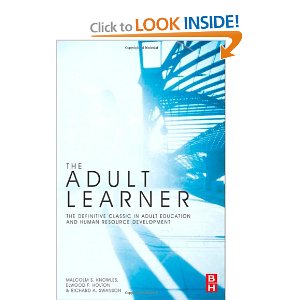 Knowles’, Holton’s, and Swanson’s The Adult Learner serves as a comprehensive overview of the field of adult education.
Knowles’, Holton’s, and Swanson’s The Adult Learner serves as a comprehensive overview of the field of adult education.
Andragogy, in contrast to pedagogy, is a field that focuses on adult learning and everything that ensues. It is “any intentional and professionally guided activity that aims at a change in adult persons” (Location 1174). It does not merely translate pedagogical principles to an adult context, but it is an attempt to focus on the adult learner and “provide an alternative to the methodology-centered instructional design perspective” (Location 124).
This book proposes and argues for six principles of andragogy: the learner’s need to know, the self-concept of the learner, the prior experience of the learner, the readiness to learn, the orientation to learning, and the motivation to learn (Location 155). These core principles are set in the context of individual and situational differences, which are subject matter differences, individual learner differences, and situational differences. This is then set in the context of the broader goals and purposes for learning, which are institutional growth, individual growth, and societal growth (Location 164).
As a result, this book is separated into three parts: part one focuses on the theory of andragogy, the second part then addresses the context that andragogy takes place, and the last part then elaborates on practice.
The six principles of andragogy are a helpful guide for every educator to ensure maximum engagement, proactive learning, and benefit to one’s students.
Context is key for adult education, so the learner’s past and present experiences bring multiple dimensions to their learning experience. Thus, “if education is life, then life is also education” (Location 748). Consequently the teacher assumes the most important role in adult education – he/she is the one who will determine if he/she will step down from the stage, and become a guide on the side, in order to become a co-learner with the students. This is the crucial step that must be taken, in order for adult education to thrive.
Since I am constantly training adult leaders to lead groups of 3, 12, or 50 other adults, it is important that I am using andragogical principles, rather than pedagogical. Not only will andragogical principles benefit the learner, but it will also create a healthier context for discipleship.
I gives this book 5 stars out of 5.